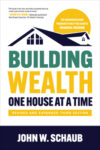

by John W. Schaub, 2023, 2016, 2005
Adam recommended this book. Adam took him fishing. See picture above. There is no picture of the author on the back of the book, either. I think he likes to remain anonymous. He’s been buying houses and leasing them out since 1975. He is extremely hard-working, smart, logical, fair. He covers everything a person needs to know to buy houses, lease them, and build wealth, one house at a time.
His advice includes his 10/10/10 rule: buy a house 10% below market price, with no more than 10% down, and with an interest rate below 10%.
He recommends buying single family houses, not apartment buildings or commercial real estate. Buy in neighborhoods with good schools, good lots (not corner lots), with yards that are fenced or can be fenced, with enough room for children and pets, in good repair, with good neighbors. He walks neighborhoods (walks them, doesn’t drive them). He knocks on doors. He asks good questions, and he provides you with those good questions. If a house is not for sale, he can end up buying it because he knows the neighborhood and asks the right questions. He used to own houses in 10 different states but that cost him too much time and money in managing them, so now he only owns houses that are within a 10-minute drive of his office.
He has never borrowed from a bank to buy any of his properties! He talks about how to do that; mostly involving seller-financing. If you find a motivated seller, with a house you want to own and rent, you can make a deal to purchase it without a bank loan. He solves the seller’s problem: maybe they need to move quick for a new job, or they just got divorced, or they are about to be foreclosed on, etc. By learning what their problem is, and solving it, he helps them out and, at the same time, gains a good house in a good neighborhood.
He lists all the questions you need to ask of potential sellers, and of potential tenants. He is ultra-fair and stresses the importance of treating every tenant applicant equally, knowing the laws, and having set policies and procedures. Ask the same questions and require the same from all potential tenants; the same rent and deposits, etc.
He has good advice for finding and keeping good tenants – ask the questions and verify their answers–with employers, landlords, former landlords, get bank statements, etc. Make sure they are stable and have enough money to pay the rent. Do not feel sorry for them. If they cannot afford it, they will not be a good tenant–write them a check to help them out of a bind, if you want, and send them on their way, but do not rent to them. Then, charge the highest security deposit allowable and make sure you get the first month’s rent and security deposit in cash or recently dated cashier’s check or money order. The high security deposit encourages the tenants to take care of the house. Provide incentives for tenants to pay on time. If they are one day late, immediately start the process of eviction (you have to). They usually will pay you then, but if they don’t, talk to them. Maybe they need to pay you weekly rather than monthly. If you can’t work something out, tell them you’ll refund part of their security deposit if they move out now. Getting them to move out quickly, without damaging your property and without having to go through the eviction process, is key. It is important to have firm and fair rental policies and contracts that everyone understands. He’s only had to evict 6 tenants out of the hundreds of tenants he’s managed over the years. He says evictions are the most expensive way to get rid of tenants. Do what you can to avoid them. Ask, “I can hire an attorney to evict you, in which case you will lose your entire deposit, or I can give you part of your deposit back if you will move out by next Friday. Would you rather I pay you or an attorney?” That is how he is – smart, fair, logical.
He recommends buying one house at a time and renting it out, and then buying another – maybe one a year for 10 years.
He started doing this in 1975 and he’ll keep on doing it as long as he can. His advice is sound. He knows this business in and out, and he’s written it down for others to follow. He is not greedy. He does not have the scarcity mentality – there’s only enough for me and no one else. His writing style is smooth, simple, logical.
Doing this, however, would require energy, passion, good communication skills. But it is a career a person could devote oneself to, that would keep one engaged and active their entire life, and this book tells you how to do it.
I like one of the quotes: “My friend Jimmy Napier is fond of saying that if you don’t know how to make money where you live, you can move; you are not a tree.”
His last chapter is, The Fuller Center for Housing. He went to a seminar at his church in 1985 and Millard Fuller spoke. Millard Fuller and his wife gave away all their money and started Habitat for Humanity in 1976 and the Fuller Center for Housing in 2005. Today, millions of people live in homes they helped to build and it’s still going strong. He ends the book:
“The Fuller Center for Housing is a non-denominational Christian organization that welcomes people of all faiths–or no faith at all–to join in eliminating the blight of poverty housing from our communities. In the richest nation in the world, it should be unacceptable for children to grow up in unhealthy, unsafe housing.
“Volunteering for the Fuller Center has helped me understand that each of us can change the world, one family at a time. Every home is a life-changing experience both for the families who live in the home and for the volunteers who help build it.
“Helping others can be a family adventure. All my children have raised the money for and built a house for a family in need. Through the Fuller Center’s Global Builders Program, you can combine an international family vacation with a volunteer experience that you will always remember…
“I hope to see you on a build site one day soon.”
Excellent book!